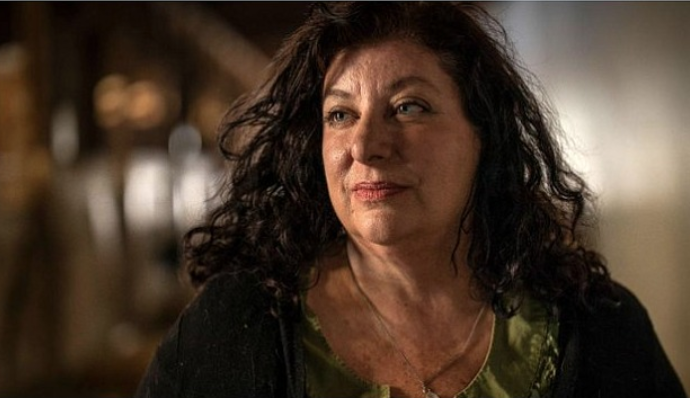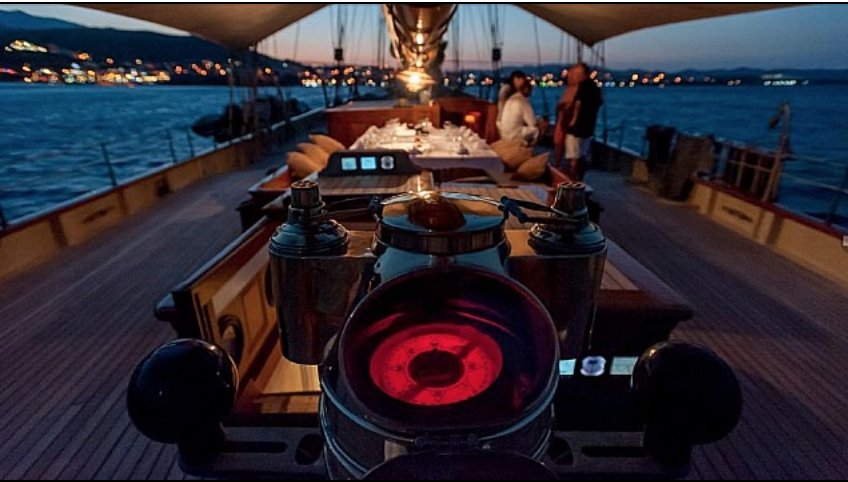The “do you have any hobbies?” bit lasts exactly eight seconds — 1:19 through 1.26. The idea isn’t to make you “laugh” but feel a slight ripple of a chuckle about sexual perversity, or John Lennon‘s cavalier sharing of same as a way of tweaking social propriety. Here’s the thing: If Richard Lester had cut on the female journalist’s shocked expression at 1:27 instead of 1:26, the bit wouldn’t land. 1:27 would have been an ounce too much — 1.26 is just right. It’s very, very hard to make a comedic bit work just so. Timing is everything.
Exactly What 90% of Critics Don’t Understand
Or, worse, understand but won’t address. Most critics tend to be dweeby, cerebral, analytical-to-a-fault types. You can tell that by just looking at some of them. Guys who never got the girl in high school…portraits worth a thousand words. And for the most part they process films in cerebral, academic terms…as objects of study rather than journeys. They know who they are, and so do some of you. Hollywood Elsewhere has always gotten the feeling thang, of course, along with a relative handful of top-dog critics — Ann Hornaday, Owen Gleiberman and Todd McCarthy, not to mention the late Roger Ebert, Pauline Kael and Andrew Sarris. If you suppress or sidestep the emotional current, you’re missing the essence of a film or certainly a good portion of it.
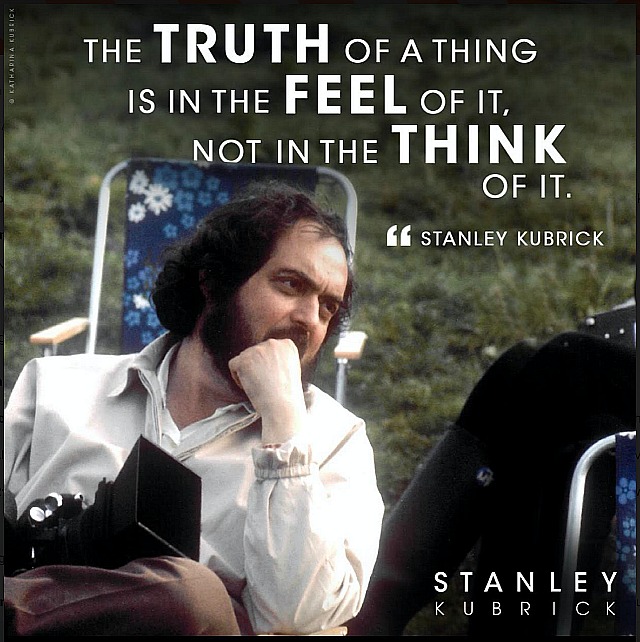
“Nice and Tight”
A two-day-old N.Y. Times story reported about President Trump‘s sudden, arbitrary announcement to deliver a commencement address at West Point in June. This will mean two things. One, West Point seniors, who’ve been studying from home due to COVID-19, will have to return to the military academy for the Trump address. And two, they won’t be able to sit six feet apart because Trump wants the seating to be “nice and tight.”
That phrase rang an immediate bell for me…Randy Newman! 37 years ago Newman used it in a “Trouble in Paradise” song called “There’s A Party In My House.”
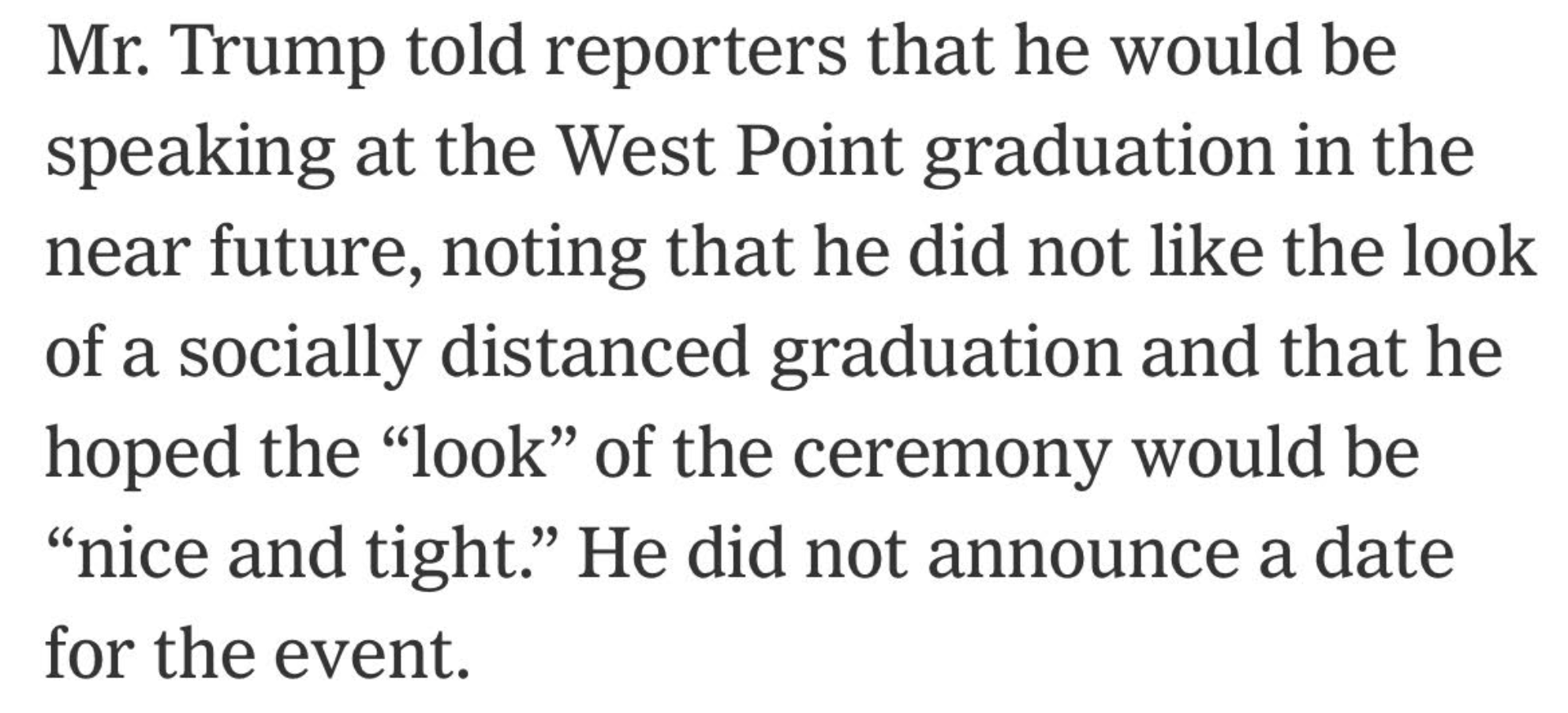

Baldwin: Free Elderly Cons, Short-Timers
WOW. Just received. A powerful video message from Alec Baldwin to @NYGovCuomo: "As the pandemic spreads, public health, safety, & basic moral decency demand you use your power to issue clemency to the most vulnerable & reduce the overall population of state jails & prisons.” pic.twitter.com/knTzAgZqca
— Scott Hechinger (@ScottHech) April 26, 2020
Weekend at Fatty’s
The general consensus is that North Korea’s Kim Jong Un — five foot seven, 300 pounds, heavy smoker — has died and gone to hell. Or that he may be a comatose vegetable. But why settle for half measures?
Nehandaradio.com, posted today: “Shijian Xingzou, a vice director of HKSTV Hong Kong Satellite Television, a Beijing-backed broadcast network in Hong Kong, claimed that Kim is dead, citing a ‘very solid source.'”
The Nehandaradio headline says that “multiple sources claim North Korean dictator died Saturday night.”
“[Shijian Xingzou‘s] post on the Chinese messaging app Weibo has been shared widely on social media, according to a report in the International Business Times.
“It was being reported as fact by media outlets in China and Japan that the 36-year-old dictator was dead. Because of the nature of the ultra secret regime in North Korea claims of Kim Jong-un’s death are very difficult to verify before an official state announcement.”
Speculation says that Kim Jong Un’s 31 year-old sister, Kim Yo Jong, could take his place, when and if the North Korean regime finally decides to acknowledge that Kim Fattycakes, 36, is indeed down for the count.
Aljazeera.com: “In the last two years, Kim Jong Un’s younger sister has been the most visible presence around the leader, serving formally as a vice director of the ruling Workers’ Party’s powerful Central Committee but unofficially as her brother’s chief of staff.
“Kim Yo Jong was named an alternate member of the party’s Central Committee Politburo this month, continuing her climb through the leadership hierarchy.
“The leader’s sister, believed to be 31, has firm control of key party functions, setting herself to be the main source of power behind a collective leadership.”
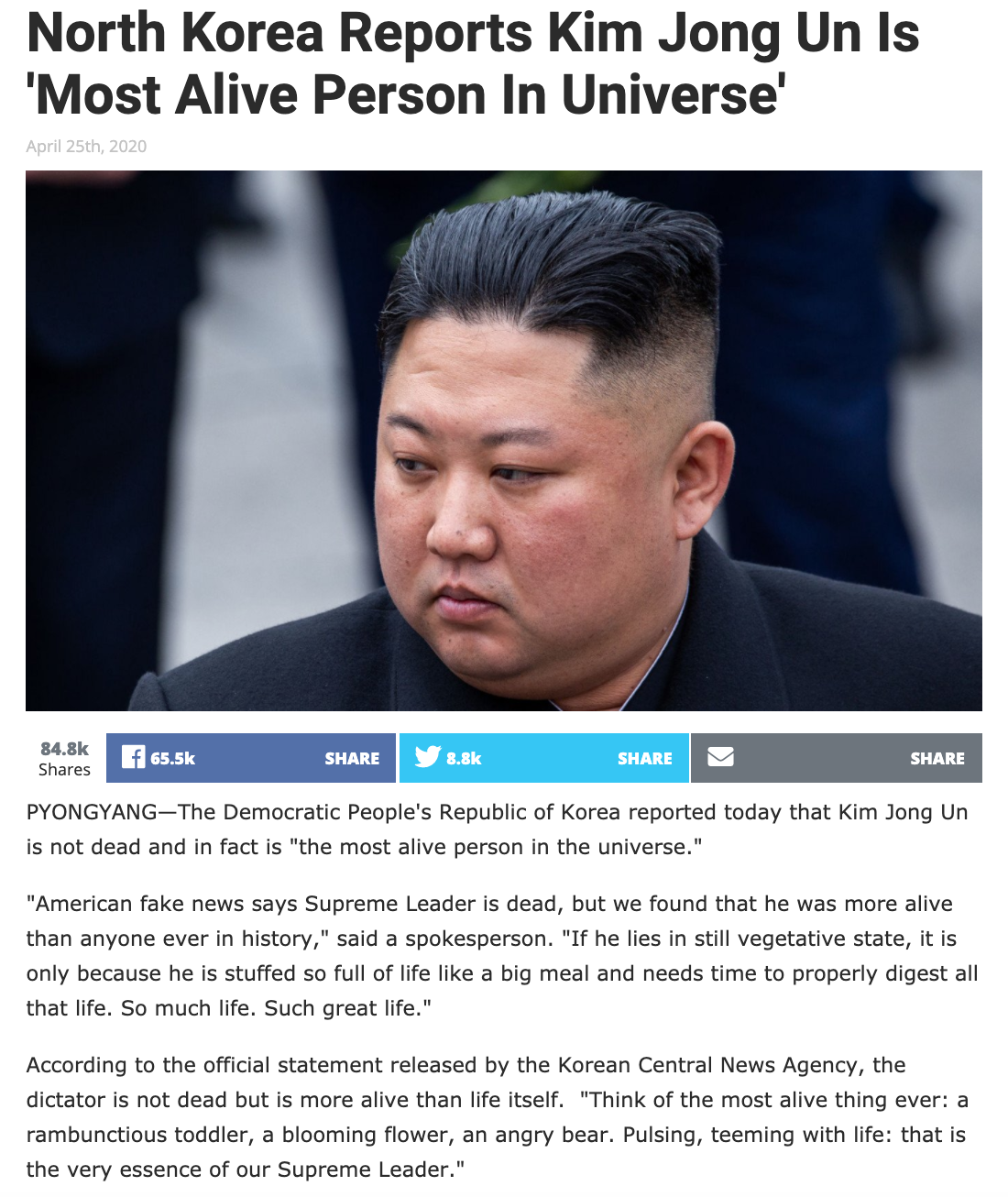
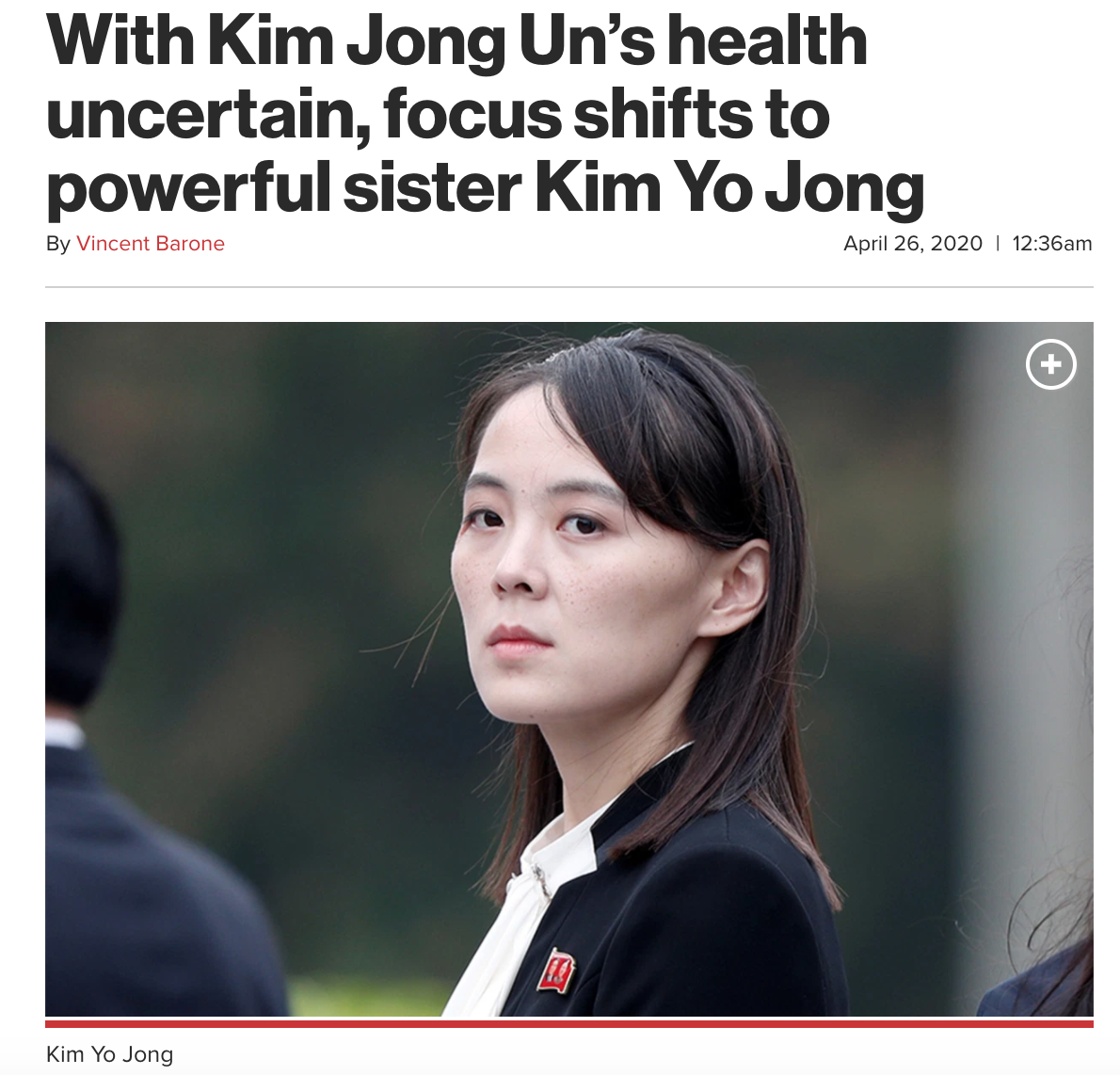
Not Half Bad
Pete Davidson: “Tired of sitting in the dark, got nothing to watch, I already did Ozark…hand sanitizer is now my best friend, using it so much it’s chapping my hands…going crazy, crazy.”
Adam Sandler: “I’m done with selfies so don’t even ask. I’m stayin’ in the house in an underwear mask. Only pet my dog with a baseball mitt, baking my own bread and it tastes like shit. I broke my legs two weeks ago and I’m too scared to go to the hospital. Never go outside because I might see my neighbor. I’m using both sides of my toilet paper.”
In Politics, Purity Is A Leg Iron
As I understand the situation, the #DropOutBiden community wants Democratic presidential front-runner Joe Biden to suspend his candidacy so the Tara Reade thing — a single alleged incident of sexual assault that may have happened 27 years ago — can be fully investigated.
I’m not saying the accusation isn’t credible, but is it really worth putting the 2020 election, which Biden appears likely to win, in jeopardy? Is it really worth that much?
It would be one thing if there was reason to believe that Biden was a serial assaulter, but the Reade thing appears to be a one-off. Do Biden’s accusers really want to give Donald Trump a club to come after Biden with, absurd as that may sound given Trump’s own history, because Biden may have once acted like an insensitive brute in 1993?
If the allegation is true, it’s highly regrettable and nothing to brush under the carpet. But at the cost of wounding Biden’s decent-guy persona and possibly losing the election…seriously? #IBelieveTaraReade is really that important? The Trump criminality and derangement syndrome isn’t a thousand times more important?
Left Twitter purists, a portion of whom are probably part of #DropOutBiden, did everything they could to destroy the candidacy of Pete Buttigieg, and between their rantings and general hostility from voters of color (including the older homophobes) they gradually took him down. But you know what? If Pete was the presumed Democratic candidate right now, I doubt there’d be any sexual allegations of any kind.
If the Biden-Reade thing goes badly (and let’s hope it doesn’t become a tumor), all I have to say to the anti-Buttigieg contingent is “thanks, assholes!”
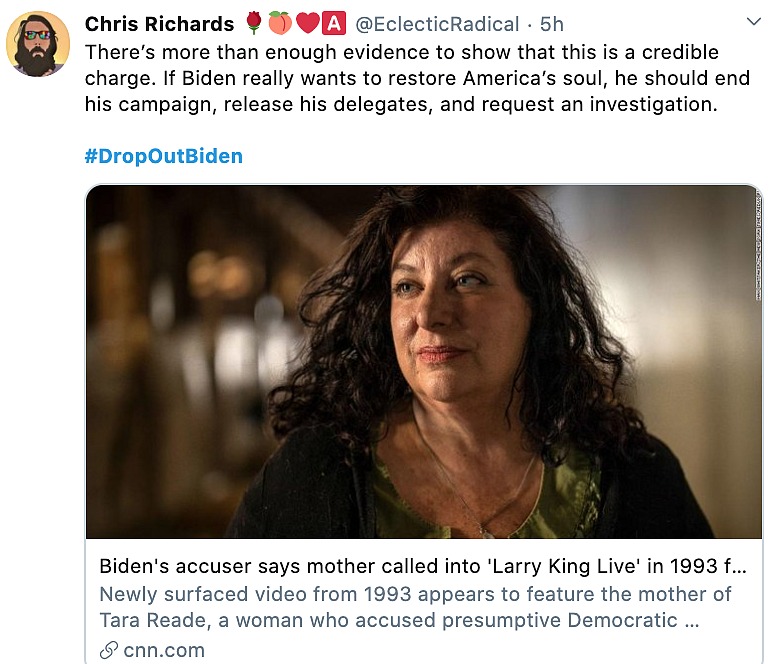
Heaving Seas
All my life I’ve dreamt of sailing a long distance on a sizable schooner. Five or six months, maybe longer. Not as an owner, God forbid, but as a traveller somehow paying my way. Or as a guest or crew member or whatever.
Down the Pacific coast to Mexico and Central America, through the Panama Canal and around the Caribbean, stopping in Belize, Cuba, Turks and Caicos and wherever the spirit points. And then across the Atlantic to the Canaries and then through the Strait of Gibraltar and then all around the Mediterranean — Spain’s Costa del Sol, southern France, Italy, Sicily, Greece, Turkey, Jordan, Israel, Egypt. Maybe even push on across the Indian Ocean to Southeast Asia.
This 37 year-old Rod Stewart music video got me going. The schooner it was filmed on, I mean. I went looking for a facsimile and quickly found one — the Atlantic, a ten-year-old, three-masted schooner, 212 feet long, steel hull, currently moored off the coast of Italy. God knows what a craft this size would cost, but if you’re loaded…
Excitement, adventure, exotic climes, unfamiliar sights and sounds, all of it nourishing. But never, ever on a grotesquely over-sized cruise ship.

Moment of Truth
At the 1:50 mark, the late Brian Dennehy tells a story about how a certain “uh-oh” look from his 8-year-old son led to a firm decision to curtail his drinking.
Almost the same thing happened to me, and the instigator was my seven year-old Dylan. It was ’96, and we were making scrambled eggs together and Dylan mishandled the frying pan and it toppled over and onto the floor, eggs and all. And I lost it.
And about 30 or 40 seconds later I said to myself, “You’re not angry over the scrambled eggs on the floor — you’re angry because you’ve had two vodka-and-lemonades and your emotions are unruly.”
That was it — the end of all hard stuff in my system. 24 years ago. But after a couple of years wine crept back into the routine. I wouldn’t embrace sobriety for another 16 years — until 3.20.12.
Slowly Germinating Mob Rebellion
Some sort of Mad Max situation in DC pic.twitter.com/3sTUg6PHNJ
— Judd Legum (@JuddLegum) April 25, 2020
Don’t Forget Almodovar’s Version
I don’t know why I forgot to watch Bad Education on the HBO screener site, but it may have been a combination of exhaustion due to wall painting, general pandemic depression and day dreaming about sailing the South Seas. Then again it premieres two hours hence (8 pm Eastern) so I’ll catch it then.
Great reviews (RT 92%) during last September’s Toronto Film Festival, and yet — this is a minor point — of all the reviews I’ve read not one has mentioned that the aspect ratio of Bad Education is 2.39:1. Not one.
“Based on a real-life scandal, Bad Education is a small and economical movie, but not slight, as it gives us a good taste of the banality of greed and entitlement, never turning its compromised characters into easily dismissed comic monsters.
“Written by Mike Makowsky and directed by Cory Finley, it shows us just how good Frank is at his job and just how much he cares about his young charges, before it lets us discover the extent of his vanity and self-serving needs. Finley and Makowsky achieve a tone that swings expertly between pathos and dark humor.” — from Matthew Gilbert’s Boston Globe review, posted on 4.23.
And it’s not a six-parter! It actually does the job in less than two hours.


